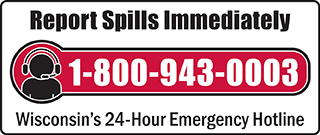Meth lab/clandestine drug lab information
Methamphetamine (Meth) is easily made in makeshift laboratories, such as rented apartments or hotel rooms. During the production of meth, indoor air and a property can become very contaminated by hazardous chemicals. There is also a high risk of fire or explosion.
When law enforcement officials seize a meth lab, they remove containers and bulk amounts of chemicals and waste, but chemical and drug residues can still remain and pose a health hazard.
Funding for meth lab cleanups
The existence of methamphetamine or “meth” labs across the country continues to not only be an illegal and dangerous problem for communities and law enforcement officials, the labs are also full of toxic chemicals, which can pose a public and environmental health hazard. According to 2010 law enforcement data, there were more than 10,000 clandestine meth lab incidents or seizures nationally, including 24 in Wisconsin.
When a meth lab is discovered/seized, police, fire and law enforcement officials may contact the U.S. Drug Enforcement Administration (DEA) in Madison or a licensed contractor for assistance with removing the bulk chemicals and waste. If the initial request is made to the DEA, they may pay for 100% of the associated removal and disposal costs. Local law enforcement staff also work with city and local health departments to ensure property owners clean up all unsafe residues of drugs and chemicals, which allows buildings and land to be safely reused.
The U.S. Environmental Protection Agency’s (EPA) Local Government Reimbursement (LGR) Program [exit DNR] provides up to $25,000 per incident for responding to the release, or threat of release, of a hazardous substance. This includes the cleanup of meth labs.
To qualify for reimbursement, EPA requires that the community provide proper documentation of costs and certification that the municipality is unable to pay for cleanup. To find out if a site qualifies for reimbursement, please contact the LGR help line at 1-800-431-9209.
State contractors
Communities can hire contractors using the DNR’s Emergency Zone Contract [PDF] to help clean up meth labs. Under this contract, companies typically work on behalf of the DNR to clean up emergency spills and other types of hazardous substance contamination.
Communities may also use the Emergency Zone Contract and work with these contractors in cases where the DNR is not party to the meth lab cleanup. Communities should still notify DNR about the cleanup. Also, any communities using the Emergency Zone Contract are solely responsible for the cost of services performed by the contractor.
A local government that conducts an emergency response action at a meth lab using the state contractors may be eligible for reimbursement through the federal Local Government Reimbursement Program.

